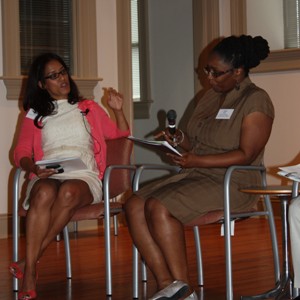
RISE was one of many strategies discussed Thursday at a regional forum hosted by the Washington Area Women’s Foundation on successful approaches to helping young women find economic security. The forum, which was held at the Public Welfare Foundation, was attended by local funders, community-based providers, policymakers and advocates.
Opening the forum, Nicky Goren, president of WAWF discussed several key drivers that build economic and financial stability for low income women — workforce development, early child care and education, stable housing, financial literacy and asset building.
Speaking to Youth Today, Goren said in recent years WAWF has shifted its focus to economic stability because the need has been so great in the Washington, D.C., community. To that end, WAWF released a report detailing successful local efforts to prepare women for in-demand jobs, some of which are traditionally male-oriented, like those in the information technology and construction fields.
Discussing the report’s key findings at the forum, Jennifer Lockwood-Shabat, vice president of WAWF, said young, low income women, many of whom are single parents, need the collaborative support of policymakers, community and education providers to succeed. She added that case management and supportive wrap-around services are also critical to helping young women succeed, as are basic skills and post-secondary education opportunities, job retention assistance and job training programs located in low income neighborhoods.
Reacting to the report’s findings, panelist Cecilia Knox, director of the Next Step Training and Education Program at Prince George’s Community College, encouraged providers to dig deeper than just surface issues. “Look at [a client’s] personal development needs,” she said, whether they are trying to get out of an abusive relationship or need mental health counseling. Panelist Allison Gerber, executive director of the D.C. Workforce Investment Council, agreed, saying that creating longer term relationships with clients through case management and supportive services is critical to helping young women find economic security.
There are no easy answers or quick solutions, Gerber told Youth Today, because “barriers change from woman to woman.” She did note, however, that research has shown that one of the primary reasons young women are disconnected from school and work is family responsibilities.
To reduce this barrier, Knox suggested community providers “have the hard conversations” with low income single mothers about “using their power to manage their reproduction.” Talk to them, she said, about how they got where they are, who in their lives can help them and where they want to go from here.
Gerber also urged service providers to “look at the whole picture,” be knowledgeable about local job availability and help young women envision how they want to develop professionally.
Goren hopes the report and forum will open a dialogue about economic stability for young women that will translate into practice and policy reform. “We’ve taken to heart what we learned from this study,” she said, and have focused our latest round of grants on the report’s key recommendations. And Goren hopes to continue the work by focusing future efforts on girls, as young as middle school, to help lay the foundation for their future education and career success.

























